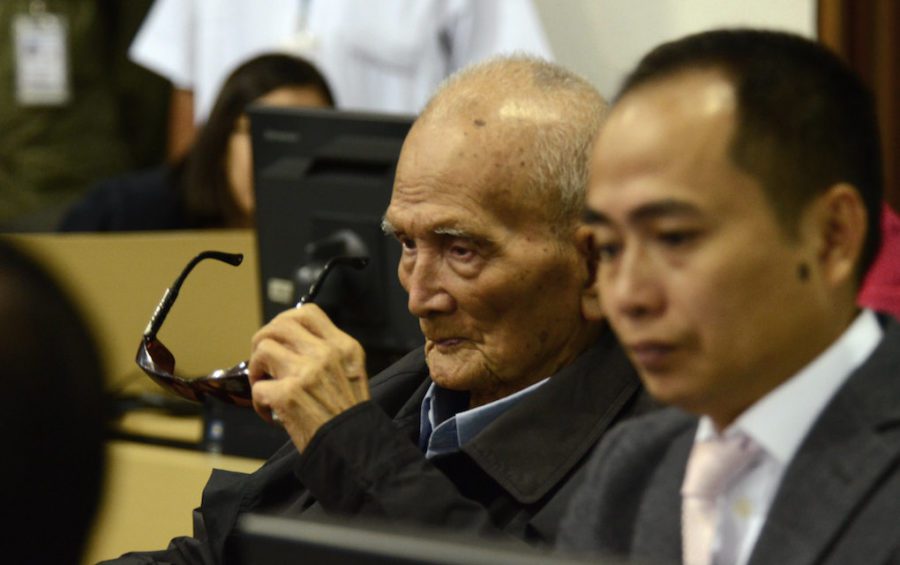Khmer Rouge second-in-command Nuon Chea’s genocide conviction will stand following his death nearly four months ago, but a “final judgement” on his guilt or innocence could not be handed down since his demise ended the appeal process, the tribunal that convicted him has said.
A legal expert on Wednesday said the Khmer Rouge Tribunal’s Supreme Court Chamber determined that the Trial Chamber’s 2018 conviction of Chea for genocide against ethnic Vietnamese and Cham Muslims and other crimes was not voided by the fact that his appeal was pending at the time of his death.
However, the higher chamber’s judges did not say whether they agreed with the lower chamber’s judgement, said Sok Sam Oeun, chief attorney at AMRIN Law and Consultants Group.
A note issued by the higher chamber summarizing the judges’ legal reasoning “says that the Supreme Court [Chamber] will not deliver any judgement on whether he’s guilty or not guilty,” Sam Oeun said.
Chea, one of two former senior leaders of the Khmer Rouge to be convicted of the crime of genocide, died in August, leaving his defense attorneys to argue that his appeal proceedings should continue post-mortem “in the interests of justice,” or if the appeal process was ended, then Chea’s guilty conviction would be vacated since he “continued to enjoy a presumption of innocence on appeal.”
On Friday, the Supreme Court Chamber, however, disagreed, and dismissed a request from Chea’s defense counsel for clarification on how Chea’s death affected appeal proceedings.
While the principle of presumption of innocence applies during all stages of criminal proceedings, “Presumption of innocence does not equate to a post mortem finding of not guilty,” the chamber said.
“Death on appeal does not convert a guilty finding at trial into a not guilty finding,” the chamber added.
The court ended the appeal proceedings in August about a week after Chea’s death, stating that his death had the “effect of extinguishing criminal actions against him.”
Cambodian criminal procedure code and an internal tribunal rule state that criminal and civil actions against an accused person end upon their death.
In its announcement on Friday, the tribunal’s Supreme Court Chamber offered the following “legal clarifications”:
- The termination of proceedings did not vacate the trial judgment.
- There is no provision for the proposed appeal to proceed after Chea’s death.
- The presumption of innocence applies at all stages of criminal proceedings.
- The presumption of innocence at appeal is a legal rule and standard applied by the judges of the Supreme Court Chamber in their review of the grounds of appeal.
- A final judgement on the guilt or innocence of Chea cannot be delivered as his death prevented any appellate review.
- Presumption of innocence does not equate to post mortem finding of not guilty.
- Chea’s death does not affect the awards of reparations to the civil parties.
Chea’s defense attorneys had their access to the tribunal’s email system revoked on Tuesday. They were fired in August, after the court ended the appeal proceedings brought by Chea the month prior.
International defense counsel Doreen Chen and Cambodian defense counsel Son Arun did not reply to requests for comment by Wednesday evening. Liv Sovanna, another co-lawyer for Chea, referred questions to a legal adviser who could not be reached.
Chen had earlier argued that completing the appeal process would allow “the truth to be finally established,” although legal experts have disputed her reasoning.
In August, Chen said it seemed as if the Supreme Court Chamber was “still undecided” about what its decision to end the appeal proceedings meant for Chea’s genocide conviction.
But she said the law is clear, claiming that Chea, who was deceased, “is now legally innocent and the Chamber needs to publicly confirm this.”
Sam Oeun, the legal expert, however, said on Wednesday that presumption of innocence did not continue after a lower court finds someone guilty and criminal proceedings cease upon their death, so Chea’s guilty conviction from the Trial Chamber should stand.
Five judges had found Chea guilty, he said.
Still, Sam Oeun suggested that the law should be revised to clarify what should happen in situations in which an accused person who was convicted dies during the appeal process.
“If the accused dies before the trial, he should be presumed innocent or not guilty, but if he dies after the Trial Chamber found him guilty, he must be presumed guilty after he dies,” the lawyer said.
“In our court, the people do not care about that case after the accused die,” he added, “but this is a special case so it’s very important.”
Chea — known as Pol Pot’s “Brother No. 2” — died in August at the age of 93. He had been sentenced to life in prison alongside former regime head of state Khieu Samphan, who is appealing the conviction.
The pair are the only two Khmer Rouge leaders to have been convicted of the crime of genocide tracing back to the regime’s rule from 1975 to 1979.













